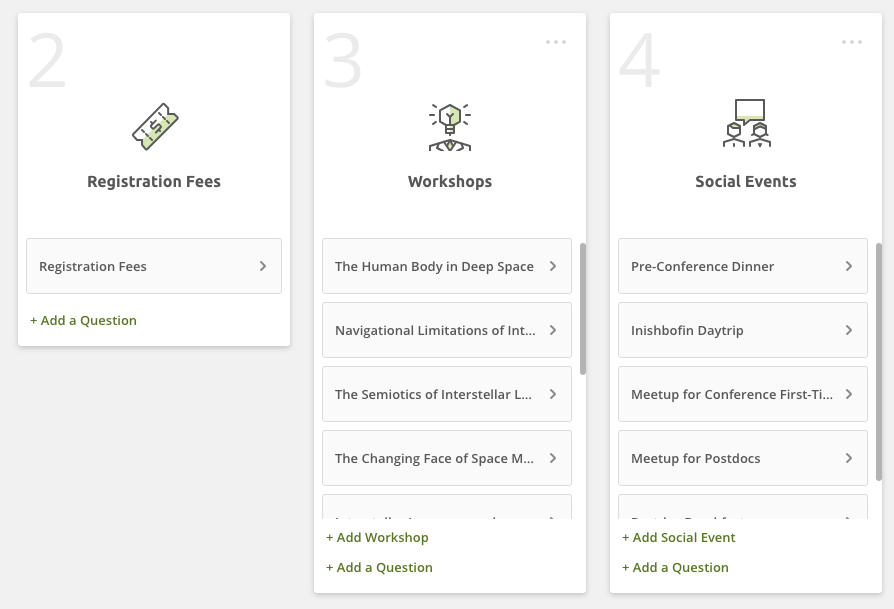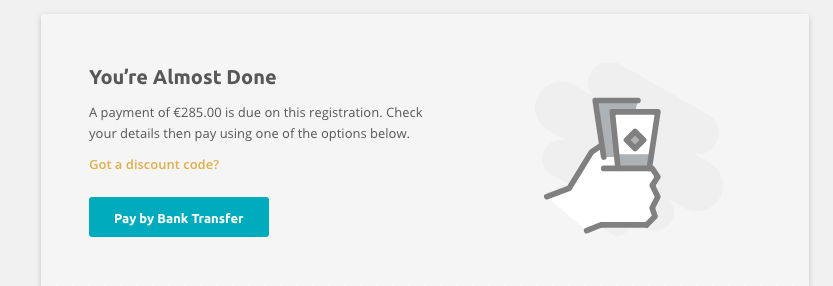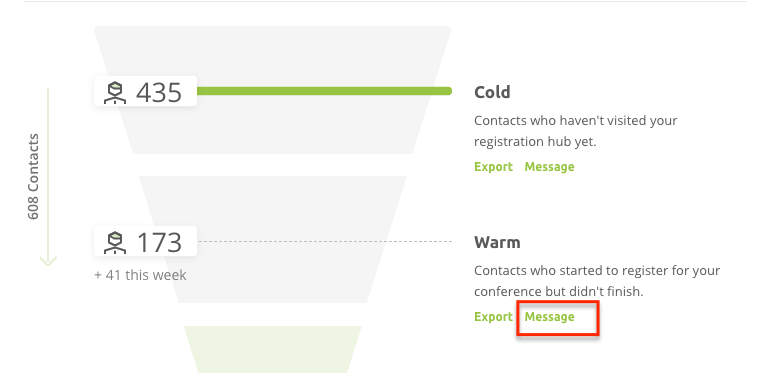8 Hacks for Conference Registration Software Success
6 minutes readBoost your delegate numbers using only your conference registration software and some clever hacks.
Sharing your registration software with potential delegates is an exciting time in the lifespan of your conference. You’ve put months of work into building your event, now it’s time for registrations to start pouring in. And in an ideal world, every single author who submitted to your conference would promptly register to attend it. But unfortunately, real life doesn’t usually work this way…
Just to keep you on your toes, registering delegates for a research conference comes with some added complications. You have all the usual registration tasks of selling tickets and collecting payments and delegate info. But because most of your delegates are also presenters, you’re in a race to register them before you can finalise your programme and your book of proceedings.
And then there’s the complication of how conference fees are paid. Think back to when you last bought a ticket for a big concert or festival. Did you put it on your card? Now what about the last conference you attended? There’s a good chance your organisation footed the bill. A good chunk of your registration fees will ultimately come from funding, grants and bursaries, not from delegates’ own pockets. This is a payment method your registration software needs to be able to handle, and collecting fees this way can take time to arrange.
So how do you encourage attendees to get organised and register so you can finalise your programme in good time? While promoting your event on free conference directories, in relevant media outlets, via your sponsors and on social media (researchers love Twitter) is hugely important in encouraging people to register, there are a few clever moves you can pull using only your conference registration software.
Don’t twiddle your thumbs, waiting for registrations to start trickling in. Instead, open your registration system at least a month before you send acceptance letters, and then use these 8 conference registration software hacks to be clever about what happens next…
1. Build a limited-access pricing model

Selling separate tickets to each event gives attendees options
When it comes to selling registrations, one size won’t fit all. Take a leaf out of the playbook of corporate event planners and build a limited-access pricing model for your conference. Rather than selling all-in registrations, separate the constituent parts of your conference into ticketed events on your registration software.
For example, offer delegates a basic fee that admits them to every session, and leave events like workshops, social outings and meals as separate items on your registration form. This gives delegates more freedom to design your conference around their needs, and stops you from excluding those who can’t afford to go to everything.
2. Give delegates incentives to register early
Use early-bird and late prices to encourage your delegates to register within a certain time period. Offering delegates lower prices when registration first goes live means they’ll have an added incentive to get organised and lock down your conference.
This way, you won’t be scrambling to raise money close to conference day and you’ll be ready to cover the cost if your caterer raises their prices on last-minute orders. And getting payments to start rolling in a few months before your event certainly doesn’t hurt.
3. Ask successful authors to RSVP
When you send letters of acceptance via your conference management software, ask your successful authors to RSVP as soon as they can. Asking them to note their intentions before they register is a handy way of getting an idea of numbers before official registrations start rolling in.
If you can, do this before you send rejection notifications to your unsuccessful authors. Then if your RSVP numbers are low, you can consider whether it’s worth creating a list of second-round submissions to accept.
4. Include payment options in your registration software

Allowing payments by bank transfer makes your conference more accessible
Think back to when you last bought a ticket for a big concert or festival. How did you pay for it? Now what about the last conference you attended? A good chunk of your registration fees will ultimately come from funding, bursaries and grants, not from delegates’ own pockets.
But if your registration software only allows for card payments, you’ll be forcing delegates to pay with their own money and wait to claim it back. This can put a big stress on their finances. So choose conference management software that lets you give them the option to pay by bank transfer as well as a card. Integrating identity verification into your registration process can help ensure secure transactions and protect attendee data.
5. Publicise bursaries and grants
While inequity at conferences may not be deliberate, addressing it has to be. Boost your event’s accessibility by offering lower fees and bursaries to delegates from under-represented groups. And consider offering subsidised childcare and allowing early-career researchers to volunteer in lieu of paying fees.
And if your conference offers any travel grants, create crystal clear criteria (by “early-career researcher” do you mean PhD students? Or everyone who isn’t permanent?) and make them easy to find on your conference website. And include links to any other grants you know about. Making info like this accessible can save would-be delegates hours of funding research.
6. Create discounts for almost-delegates on your registration software

Your delegate registration funnel on Ex Ordo
If your registration software allows it, identify people who started to register but didn’t complete your form. These “warm” contacts are ideal to target with reminders and other goodies to nudge them towards completing their registration.
For example, you could create a time-limited discount code (e.g. “20% off for the next 7 days”) for this group, which might be just the encouragement they need to complete their registration.
7. Carefully time when early-bird prices expire on your registration software
It might take people a bit of time to organise the funds to pay for your conference, so give accepted authors plenty of time to register before your early bird prices expire. In an ideal world, you want your early-bird prices to finish up around a month after you send letters of acceptance.
This way, you won’t ruffle any feathers with accepted authors missing out on lower prices.
Maximising delegate participation begins with optimising your conference registration software. By leveraging its capabilities and implementing innovative strategies, you can propel your event to new heights of success. From creating tailored pricing models to incentivising early registrations, every step you take contributes to a seamless and engaging registration experience. So, don’t just rely on conventional methods—embrace the power of technology and strategic thinking to unlock the full potential of your conference. With the right tools and a dash of creativity, you can elevate your delegate numbers and ensure that your event leaves a lasting impression on all who attend.
8. Keep your conference registration form simpleAs with selling tickets for any event, you should aim for a short and simple registration process. Collecting a certain amount of delegate info is important. But every question you add to your registration system is a hurdle. The more questions, the more time it will take to register, which means more opportunities for people to run out of steam or for things to go wrong.
So keep your registration form as short as possible. And once you’ve set up it up, test it, and then test it again. Testing your software will help you see how straightforward your registration process is, but it’s also a good way to make sure no problems will arise when delegates start registering for real.
The importance of solid registration software
The registration portion of any event is usually a magnet for things going astray. And when you add the complications of a conference into the mix, things can get hairy. So do yourself a favour and source registration software that’s built for research conferences. For the most success make sure you have your conference apps right.
In conclusion, optimising conference registration processes is crucial for boosting delegate participation and ensuring event success. Leveraging smart strategies like tiered pricing, early-bird incentives, and simplified forms not only streamlines the experience for attendees but also allows organisers to manage resources efficiently. Offering diverse payment options and promoting bursaries can also enhance accessibility. By utilising these software hacks, conference planners can drive registrations, reduce drop-offs, and maintain engagement. Ultimately, a well-structured registration system sets the foundation for a seamless and memorable event experience.

.jpg?width=68&height=68&name=Brian-Headshot%20(2).jpg)


